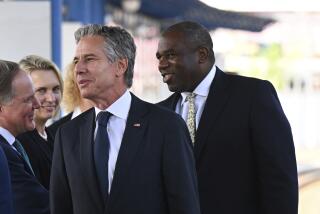Further Into the Post-War Iraq Horror : Bush Administration launches major aid effort but shoots down British proposal
- Share via
At 7 this morning the permanent United Nations cease-fire takes effect in Iraq. In theory, that closes the book on Iraq’s invasion of Kuwait. But it’s hard to escape the feeling that a Pandora’s box has been opened in the Gulf, threatening to bedevil the region for years to come.
Baghdad’s horrible war of vengeance against Kurdish and Shiite rebels now lodges like an insomnia-inducing nightmare, disturbing any sense of allied accomplishment for Iraq’s humiliating expulsion from “Province 19.” Hundreds of thousands of Kurds are taking refuge on the Turkish-Iraqi border, prompting the Bush Administration to launch what is being touted as “one of the largest humanitarian efforts ever,” in the Pentagon’s effusive words.
Too bad that effort comes a little bit on the tardy side, not only for the many Kurds and Shiites who are now dead or sure to die, but for the reputation of the Bush Administration, which had been basking in the glory of the great U.S.-led victory.
But now international criticism is rising--and domestic doubts are increasing as well. A new Gallup poll released yesterday shows a 14% drop in public approval for the way President Bush has been handling the post-war Gulf. “It is a precipitous decline,” said a spokeswoman for the Gallup organization, which conducted the survey. “Anything over 6% or 7% is unusual.”
Strains are also showing among the allies. The other day British Prime Minister John Major offered what we thought was an interesting proposal for a U.N.-backed resolution calling for a zone of safe haven for Kurdish rebels in northern Iraq. Member states of the European Community strongly backed the idea, but the Bush Administration, while shaking a new stick at Baghdad and warning Hussein from continuing air and ground operations in a wide swath of northern Iraq, initially scoffed at it.
Bush is now said to be warming to the idea. At the very worst Major’s proposal would loom like a fearsome 2-by-4 over the head of Baghdad, whose propensity for missing the true meaning of serious messages is already well demonstrated; even a serious discussion of the proposal at the U.N. might dissuade Saddam Hussein from pursuing his campaign to liquidate the rebels.
Certainly Washington should not shoot down the British plan for aiding the Kurds as quickly as it proposes to shoot down any rebel-attacking Iraqi helicopters or planes.
More to Read
Sign up for Essential California
The most important California stories and recommendations in your inbox every morning.
You may occasionally receive promotional content from the Los Angeles Times.










